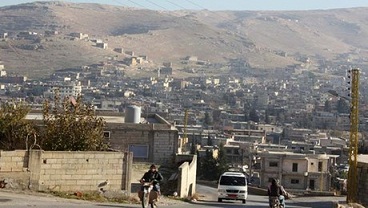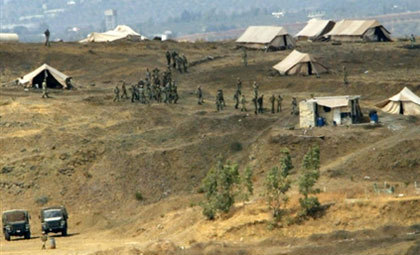The half hour drive from the Lebanese border at Masnaa to Damascus is always pleasant with the wide ...
 The half hour drive from the Lebanese border at Masnaa to Damascus is always pleasant with the wide, well paved and maintained highway, cutting through rolling hills often with large herds of goats and sheep lazily watching the traffic below. As this observer watched some of the herds the other day when traveling to Damascus, I noticed that there appeared to be an unusually large number of shepherds above us tending their herds. On second look, the shepherds turned out to be soldiers peering down on the main highway from among and behind the vegetation nibbling animals.
The half hour drive from the Lebanese border at Masnaa to Damascus is always pleasant with the wide, well paved and maintained highway, cutting through rolling hills often with large herds of goats and sheep lazily watching the traffic below. As this observer watched some of the herds the other day when traveling to Damascus, I noticed that there appeared to be an unusually large number of shepherds above us tending their herds. On second look, the shepherds turned out to be soldiers peering down on the main highway from among and behind the vegetation nibbling animals.
The increased security in Damascus has brought hundreds of shabab (youths), shabiha (“ghosts” in Arabic, but in the vernacular, “thugs”), popular committees, neighborhoods watch types and one presumes various security agency personnel from their early 20’s to middle age to control literally hundreds of checkpoints in central Damascus and the suburbs. Sometimes it appears that every fifty yards or so one encounters yet another checkpoint.
Damascus is currently calm with a few exceptions such as the Tadamon, Al-Qadam and Al-Asali neighborhoods where sporadic clashes are being discussed by friends the past two days. As with Libya last summer, many media reports are not at all accurate in depicting this city as on the edge and a panicked population. Last night this observer was up until almost 1 a.m. with friends in the old city at a restaurant and then driving around Damascus with still some cafes open, although according to local residents not as late as before the crisis began.
There are also plenty of security measures being strictly imposed around many governmental building including erected cement walls and the closure of nearby streets that cause traffic problems.
The Syrians are very serious about security. One government official told this observer, “Look, if someone is intending to become a suicide bomber, it is very difficult for us to stop them. But we are doing our best and we conduct many random vehicle searches.” A checkpoint experience here is not like in Lebanon where typically an approaching driver will simply roll down his window with a quick salute and a grinned “kefack habibi?” (“How are you dear?”) as the frequently soldier often just waves through the vehicle. In contrast, Syrian checkpoints employ hi-tech weapons and explosive detection devices and search most cars, from underneath-up. Near government buildings or certain streets where high ranking officials have homes or offices metal detectors are also used.
This observer had an experience with a metal detector yesterday and with half a dozen or so security guys. Passing thorough the airport style device, having emptied my pockets of any metal and my phone, the loud alarm still went off. I was asked to pass through a second time. I did with the same result. As three guys came close with new model hand held devices now being used, I also set off their alarms.
It finally dawned on me what the problem was.
 I have recently had a state of the art pacemaker implanted a few inches on my chest. I suddenly remembered that my cardiologist in Beirut warned me against passing thru a metal detector or allowing a hand held scanning device to come within two feet of me my pacemaker due to potential electronic problems.
I have recently had a state of the art pacemaker implanted a few inches on my chest. I suddenly remembered that my cardiologist in Beirut warned me against passing thru a metal detector or allowing a hand held scanning device to come within two feet of me my pacemaker due to potential electronic problems.
Too late for that precaution, I opened my shirt and pointed to the four inch square lump in my chest and said “batterie.” Not being understood, two of the guys cocked their Kalashnikovs and things got tense. Later I was informed that they were pretty sure I was another of the recent suicide bombers plaguing Damascus and the lump was a bomb and they were edgy.
The situation was diffused by a middle aged fellow who apparently was the squad’s commander. When he approached me, by now I had my hands up, I said, “batterie, batterie, Dr.” He stared at my chest and replied, “Yalla, batterie, cardio, nam?” (“Ah, for your heart yes?”) After a little more discussion and checking my passport and visa I was on my way. This morning the young lady at the guest relations desk in my hotel kindly wrote me a card in Arabic, for future use if necessary, that I had a pacemaker and would very likely set off metal detectors. So as long as no one tips off my dream doctor at Hezbollah’s Cardiac Center in Beirut she won’t shout at me during our next appointment.
Sanctions as indiscriminate weapons against non-combatants
The legality of the western imposed sanctions on Syria and Iran are being discussed at the University of Damascus as well as among some officials and NGO’s here. A fairly cogent argument can be made that the type of sanctions being imposed on Syria and Iran are illegal under international customary law and, as with the banning of cluster bombs in 2008, should also be outlawed by an international convention. This is because the sanctions are political, rather obviously designed to achieve regime changes. They are also fundamentally indiscriminate and target and endanger the civilian non-combatants population particularly the poor, young, infirm and senior citizens
Claims are made in Washington and Europe that the increasing layers of sanctions target only the regime’s leader and its policies. This is nonsense. As in Iraq where US organized sanctions have been found to be a main cause of nearly 500,000 deaths of children, those seriously affected here are not the government officials.
The sanctions, as designed for application to both Syria and Iran also violate Art. 2 (4) of the UN Charter which commands that all Members shall refrain in their international relations from the threat or use of force against the territorial integrity or political independence of any state, or in any other manner inconsistent with the Purposes of the United Nations.
In discussions with officials as well as a rough cross-section of the citizenry of Damascus, including shoppers and clerks at a central Damascus supermarket, as well as students, it is possible to get a fairly good idea how the Western imposed sanctions are affecting families here.
A progressive Syrian journalist who works part time with an American NGO, and is critical of the Assad government but even more so of the desperate rebel groups, shared a fairly representative analysis regarding what is the current situation in Damascus regarding the Western sanctions:
|
“I think the sanctions being imposed on our country have a tremendous effect on the current crisis. Prices on average have risen at least 40 percent, especially consumer goods and basic food, like meat, milk bread, vegetables, fruit etc. Eggs and chicken have doubled in price and are unavailable in some small shops. Lines are getting longer at some gas stations in some parts of Damascus. The sanctions have also forced many people to close down their factories in Damascus and Aleppo because of lack of raw materials, and the spiral increase in their prices. My daughter works in an accessory household company. They need to import materials from Turkey. Clothing is more expensive since Turkish goods are not entering. I believe her company will close down soon. You can talk to her about it if interested. My son is considering travelling because of the lack of job opportunities. Young men his age are very frustrated here and some of the idle young are joining gangs and being recruited by ‘jihadist’ groups offering cash and weapons along with indoctrination. As a mother I worry about him staying out of trouble but young people don’t seem to listen. The crisis has also forced employers to discharge people to cut down expenses. Many merchants have already left the country and transferred their money elsewhere. Others, such as warmongers, have benefitted from the crisis. Smuggled goods are expensive if available. The sanctions have hurt the ordinary people more than the regime by far. We are far worse off than 20 months ago.” |
What worries this observer a bit is that last night a businessman close to the leadership assured me that “We can fight ten years to retain control of Damascus from Al Qaeda and the fanatics. Do not worry my friend.”
Worried? I was speechless. Because on exactly August 12, 2011, these were the exact words spoken to me by a friend, Mr Khaled Kane, a good man and at the time Deputy Foreign Minister of Libya. Ten days later, not ten years, Tripoli fell to the rebels and following arrest, torture, and now ill health, Khaled languishes in a Misrata jail.
Franklin Lamb is doing research in Syria and can be reached c/o fplamb@gmail.com
